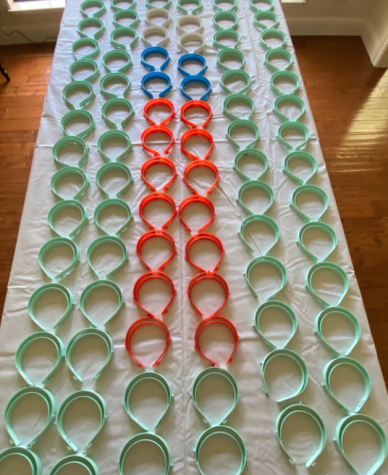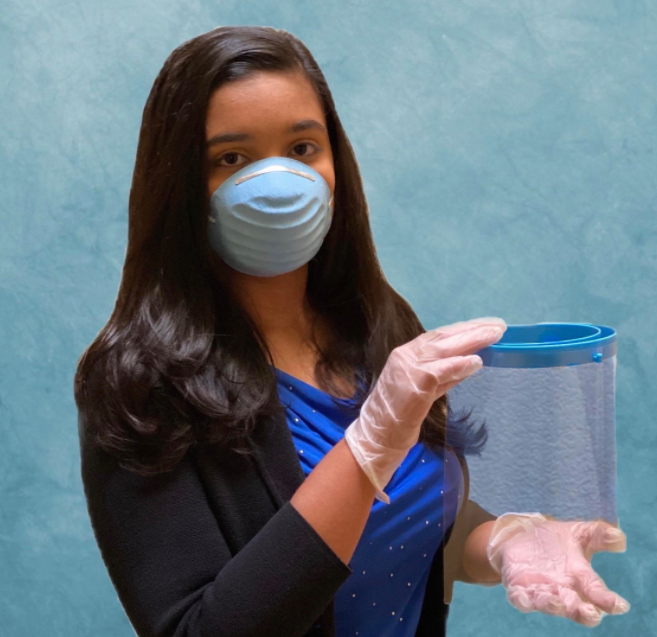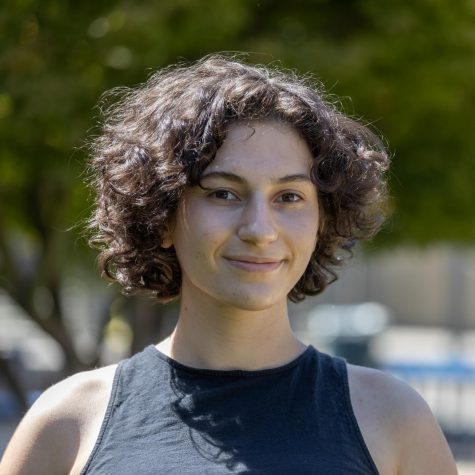STEMing up to the task of engineering a brighter future
In seventh grade, sophomore Sophia Shams started her STEM non-profit organization The Robonauts. In the midst of the pandemic, Sophia began a subproject under The Robonauts to 3D print face shield parts and supply them to hospitals in need all over the country.
May 21, 2020
Sophomore Sophia Shams’ early-found fascination for technology had her coding at six, competing on an all-girls robotics team and starting her non-profit organization, The Robonauts, by twelve.
“I was pretty young when I started getting into STEAM,“ Sophia said. “A big influence for that was my parents, who worked for Apple pre-iPhone. In my family, product launch days were a really big deal. It was so exciting, even when I was little, to see these revolutionary technologies coming out.”
Both her growing passion for mechanical engineering and extensive coding experience led Sophia to join Space Cookies, a competitive robotics team created out of a partnership between NASA and Girl Scouts. Although Sophia thrives in a high-pressure environment, she has experienced her fair share of discomfort in the male-dominated competitions Space Cookies enters.
“I was told at my first competition, my first match ever that I was driving [the robot], ‘Can you just stay right here, we don’t want you to get in the way,’” Sophia said.
Sophia persisted through the discrimination, but many other female competitors began to feel the immense pressure of having to prove their worth. This breaking point encouraged Sophia to create a subproject of The Robonauts called STEMup. In this six-month webinar series, Sophia teaches STEM basics and lifelong skills to middle schoolers in the Mount Pleasant Elementary School District after-school programs in East San Jose.
“I started seeing girls that were dropping out of their teams because they didn’t want to deal with the situation,” Sophia said. “My goal was to help ensure that girls felt like they could be a leader and that they could stay inside these programs at least for thirty minutes a month.”
By teaching these monthly classes on topics from cybersecurity to developing a growth mindset, Sophia has empowered her students to believe in their ability to make a difference and showed them the importance of their voice. Sophia is also working on making her leadership materials open-source to allow a greater number of schools to teach empowerment in an educational environment.

Additionally, with the current need for durable and accessible masks, Sophia has found a way to intertwine her passion for mechanical engineering, medicine, and making a difference: 3D printed face shield headbands.
Sophia initially planned to purchase a 3D printer using her savings to print a couple dozen masks and individually donate them to hospitals in her area. However, with her grant application to the American Medical Women’s Association (AMWA) and donations to her GoFundMe page, Sophia quickly expanded her scope of impact as one of The Robonauts’ subprojects. She also realized that her robotics team members and other teams were eager to put their 3D printing experience to good use and collaborate with her nonprofit.
With her growing grant of about $2,500, Sophia purchased a couple of printers and sent them to teammates around the Bay Area to begin the headband-making process. She even volunteered to walk others through the set-up process through FaceTime to ensure the success of her project.
In addition to fulfilling over 1,360 orders for her masks, Sophia’s goal is to have minimal contact with the headband pieces she’s printed in order to maximize safety. After completion, Sophia places the plastic inside a bag with tongs and then ships it off to Infinite Peripherals, a company that assembles and ships the finished masks to hospitals in need.
“A piece of advice I would give is that once you have your idea, start talking to people and start getting ideas on how to make it happen,” Sophia said. “Especially if you’re doing something good, a lot of people are going to get behind you and want to help you.”
Reflecting on the creation of her registered non-profit, Sophia never imagined that her small passion project would transform into a life-changing initiative.
“I didn’t know how big of a deal this could be,” Sophia said. “This experience really showed me that if you work on something consistently, it’ll eventually work out for you. It doesn’t matter if you’re thirteen, you could start an organization. If I could, then why can’t anyone else?”




